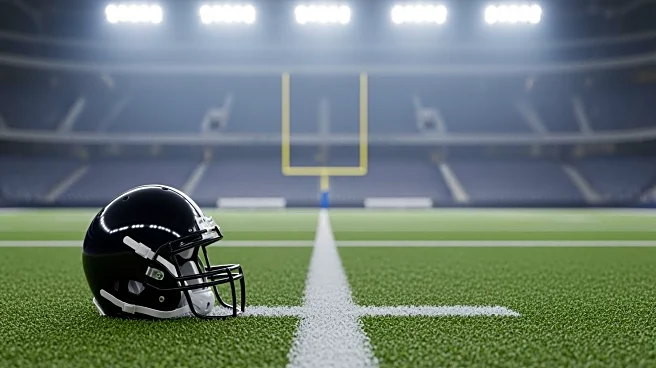What's Happening?
Marshawn Kneeland, a player for the Dallas Cowboys, has died from an apparent self-inflicted gunshot wound. According to police dispatch audio obtained by TMZ Sports, Kneeland was involved in a mental health episode, during which he sent concerning messages
to his family and girlfriend. The incident unfolded late Wednesday night when Kneeland's girlfriend reported receiving a message indicating his intent to 'end it all.' The NFL contacted Plano PD after Kneeland texted his family goodbye. Kneeland was involved in a police pursuit following a traffic violation, which ended with his car crashing on the Dallas Parkway. His body was later found inside a portable toilet with a gunshot wound. Kneeland was a former Western Michigan Bronco and was remembered by his agent and the Cowboys organization as a beloved teammate.
Why It's Important?
The death of Marshawn Kneeland highlights the ongoing mental health challenges faced by athletes, particularly in high-pressure environments like professional sports. Kneeland's tragic end underscores the need for increased mental health support and resources for players. The incident may prompt discussions within the NFL and other sports organizations about the importance of mental health awareness and intervention strategies. It also serves as a reminder of the personal struggles athletes may face despite their public success. The loss of Kneeland is a significant blow to his team and community, emphasizing the need for proactive measures to support mental well-being in sports.
What's Next?
In the wake of Kneeland's death, the Dallas Cowboys and the NFL may review their mental health support systems for players. There could be increased advocacy for mental health resources and initiatives aimed at preventing similar tragedies. The incident may lead to policy changes within sports organizations to better address mental health issues. Additionally, there may be public and media scrutiny on how sports teams handle mental health crises among their players. The Cowboys have expressed their condolences and support for Kneeland's family, which may lead to further community outreach and support efforts.
Beyond the Headlines
Kneeland's death raises broader questions about the stigma surrounding mental health in sports and society. It highlights the need for cultural shifts in how mental health is perceived and addressed, particularly in environments that prioritize physical performance and resilience. The tragedy may inspire conversations about the ethical responsibilities of sports organizations to prioritize player well-being beyond physical health. Long-term, this could lead to more comprehensive mental health programs and a reevaluation of the pressures placed on athletes.















